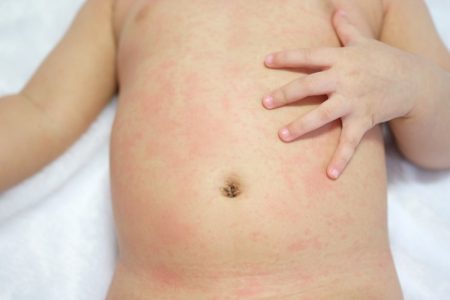Children skin conditions

There are many skin conditions seen in adults can also affect children. Atopic dermatitis of varying severity is by far the most common skin condition treated by dermatologists.
Pediatric viral exanthems
Exanthem is a widespread skin eruption that is usually associated with systemic symptoms such as fever, headache, malaise, irritability, poor appetite and bodyaches.
Childhood viral exanthems are very common and are usually a skin reaction to specific viral infections such as chickenpox (varicella), roseola (HHV 6), erythema infectiosum (parvovirus B19).
Measles and rubella are less commonly seen these days with proper childhood immunisation. Rashes of the various exanthems have distinctive patterns of rashes and prodromal symptoms (prior to rashes) allowing clinical diagnosis.
Treatment is usually symptomatic with fever medicine, topical creams to soothe the skin, bed rest and plenty fluids.
Exanthems due to bacterial infection
Sore throat, fever and characteristic rashes can occur in scarlet fever as a result of streptococcal bacterial infection, and oral antibiotics should be started early to reduce the risk of complications.
If there are also blisters together with widespread rash and fever, staphylococcal scalded skin syndrome should be considered and treatment usually requires hospitalisation with intravenous antibiotics and proper skin care.
Other non-specific viral exanthems
Pityriasis rosea has a characteristic pattern of rashes predominantly affecting the body and usually affects older kids/teenagers. The cause is unknown, the viruses most commonly associated are HHV 6 and 7.
The rashes can last longer for a few months, and treatment is symptomatic with creams or in severe case, phototherapy might be required.
Another characteristic viral -related rash eruption (many different implicated viruses) predominantly affecting the arms, legs and buttocks is Gianotti-Crosti syndrome, usually affecting younger kids.
Impetigo
This is a common childhood superficial bacterial skin infection characterised by pustules with honey-coloured crusted sores on the skin, sometimes causing blisters.
It is more common in children with underlying atopic dermatitis, and occurs more commonly on exposed areas such as face and arms, but may also affect the body and other areas.
Proper skin care, oral antibiotics and contact precautions are required for treatment and prevention of infection spread.
Fungal infections
Superficial skin fungal infections are commonly seen in children and are typically acquired via direct contact with infected animals or people, or indirectly from exposure to contaminated soil.
They can affect any part of the body such as the scalp, face, body, groin, feet and nails.
Treatment is with topical anti fungal creams, and in some cases, oral anti-fungal medications are necessary.
DISCLAIMER:
The information written and published on this website is not intended to substitute the recommendations of a trained professional and does not replace a professional consultation.
It is advisable to undergo a formal consultation to help establish a relationship between the doctor and yourself, accurately determine your concerns/problems, and get the appropriate treatments for them.
It is also imperative to note that the contents of the website with respect to treatments, results and pricing can vary from individual to individual, and can only be accurately determined by the doctor upon diagnosis.
Do note that all medical treatments will only be administered upon proper consultation, with the requirement that patients be above 21 years of age to provide legal consent.
Medical Dermatology
Meet your Dermatologist

Dr Tay Liang Kiat
Dermatologist
Dr Tay Liang Kiat is a fully accredited Dermatologist who specialises in skin cancers, Mohs micrographic surgery, dermatologic and nail surgery, aesthetic dermatology and laser procedures. With more than 20 years of clinical experience, he also manages other aspects of general ambulatory and inpatient dermatology, including eczema, psoriasis, acne, urticaria, hair loss, children skin issues and other complex medical dermatology. In addition, he has expertise in the use of the latest immunotherapy (biologics) treatment for severe eczema, psoriasis and urticaria.



